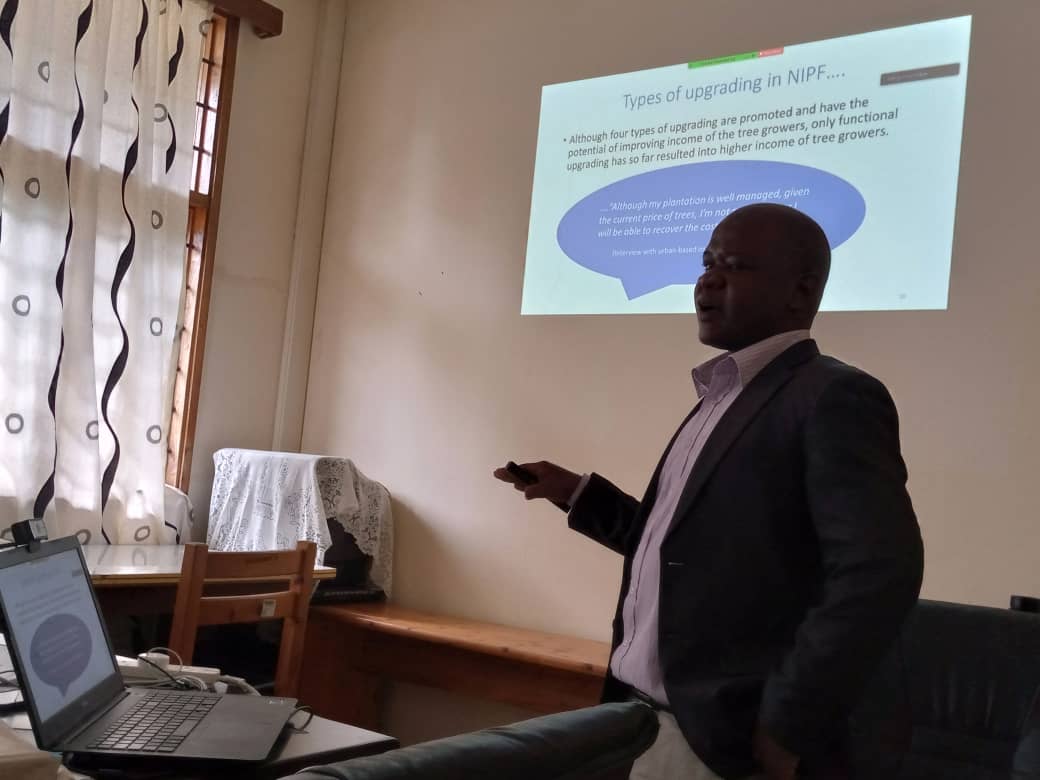Published on 4th March 2021
 On 25th February 2021, after the ups and downs of a Ph.D. program, Respikius Martin, an academician from the Department of Agricultural Extension and Community Development, ultimately completed his mission by successfully defending his doctoral at SUA. The title of his thesis is “Institutions governance and upgrading in non-industrial private forestry value chain in the Southern Highlands of Tanzania, at the Sokoine University of Agriculture. The department takes this opportunity to congratulate him on his achievement.
On 25th February 2021, after the ups and downs of a Ph.D. program, Respikius Martin, an academician from the Department of Agricultural Extension and Community Development, ultimately completed his mission by successfully defending his doctoral at SUA. The title of his thesis is “Institutions governance and upgrading in non-industrial private forestry value chain in the Southern Highlands of Tanzania, at the Sokoine University of Agriculture. The department takes this opportunity to congratulate him on his achievement.

Below is an abstract of his P.h.D Thesis
The demand for timber and the limited capacity of governments and corporations to supply the deficit are among the factors for the rise of Non-industrial Private Forestry (NIPF). In developing countries, NIPF is dominated by smallholder farmers and thus presents a huge potential for alleviating poverty in rural areas where the majority of farmers live. The institutional framework and governance of the NIPF value chain are well recognized for influencing the benefits accrued from NIF and their distribution. However, in Tanzania, most studies on the role of institutions and governance have been on natural forests and industrial plantations. Using the theory of access and the global value chain, particularly the institutional framework and governance structure dimensions, this study analyzed the role of institutions and governance in the non-industrial private forestry value chain in the southern highlands of Tanzania. Specifically, the study intended to 1) Analyze the role of state regulations in governing the timber value chain 2) Examine the role of informal institutions in the timber value chain, and 3) Analyze the types of upgrading in the NIPF value chain and the institutions driving them.
Principally, the study adopted an exploratory cross-sectional study design whereby qualitative data were collected through in-depth interviews, focus group discussions, observations, and document reviews. In addition, quantitative data were collected for the study from six district councils from Njombe and Iringa regions. Thematic analysis was used to analyze qualitative data while SPSS software was used to analyze quantitative data.
The study findings showed that the government is the sole regulator of the NIPF value chain, and all actors in the chain operate under the same regulatory framework. This was not unique as similar cases are found in many developing countries. However, in Tanzania, regulations are implemented differently at the district council level whereby some council, unlike others, charges higher the cess per piece of timber. Lack of distinction between industrial and non-industrial private forestry has resulted partly in high transaction costs, which are unaffordable to the majority of actors in the NIPF value chain. Although the regulations affect the incomes of all actors, tree growers are the most-affected category. Besides, the study found that trust between value chain actors played a role of integrating actors in the value chain. However, in some instances, it also excluded some actors from accessing the timber market under the guise of lacking or having a low level of trust. Furthermore, the study found that although four types of upgrading are promoted, only functional upgrading was found to have resulted in higher income among tree growers.
In view of the study findings, it is concluded that although forest regulations were set to facilitate the operations of NIPF and to improve its contribution to rural livelihoods; some of the regulations have resulted into unintended negative effects by limiting the actors of the value chain from gaining more income. Similarly, informal institutions, particularly trust, play an important role of integrating actors in the value chain by enabling them to access the regional market. It is recommended that in order for NIPFs to contribute significantly to the income of actors, the government, through the Ministry of Natural Resources and Tourism should remove barriers that limit tree growers and other actors from gaining access to the markets. In addition, in order for upgrading strategies to contribute to the improvement of rural livelihoods in the Southern Highlands of Tanzania, institutions promoting upgrading in NIPF value chain should pay attention to the needs of the tree growers.

